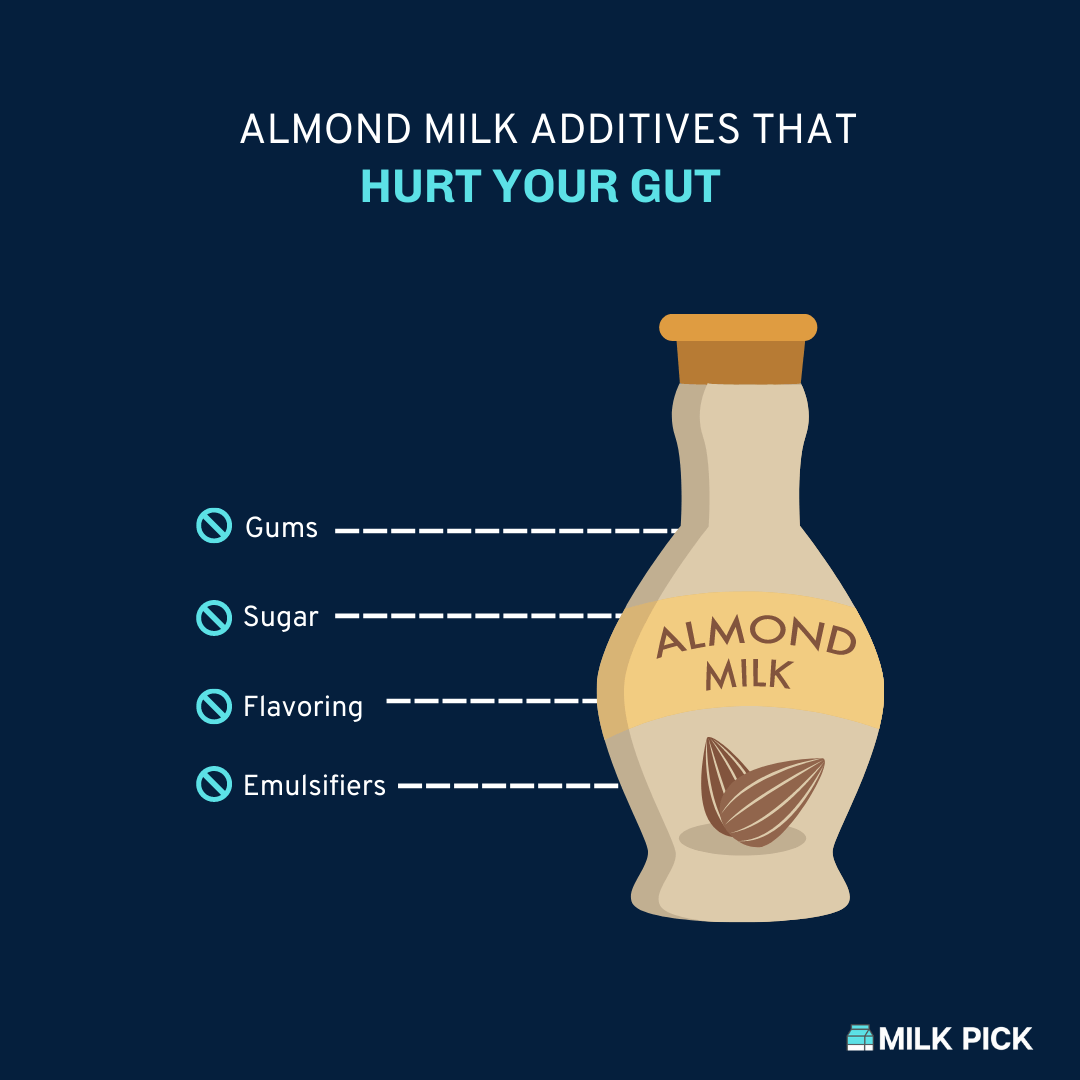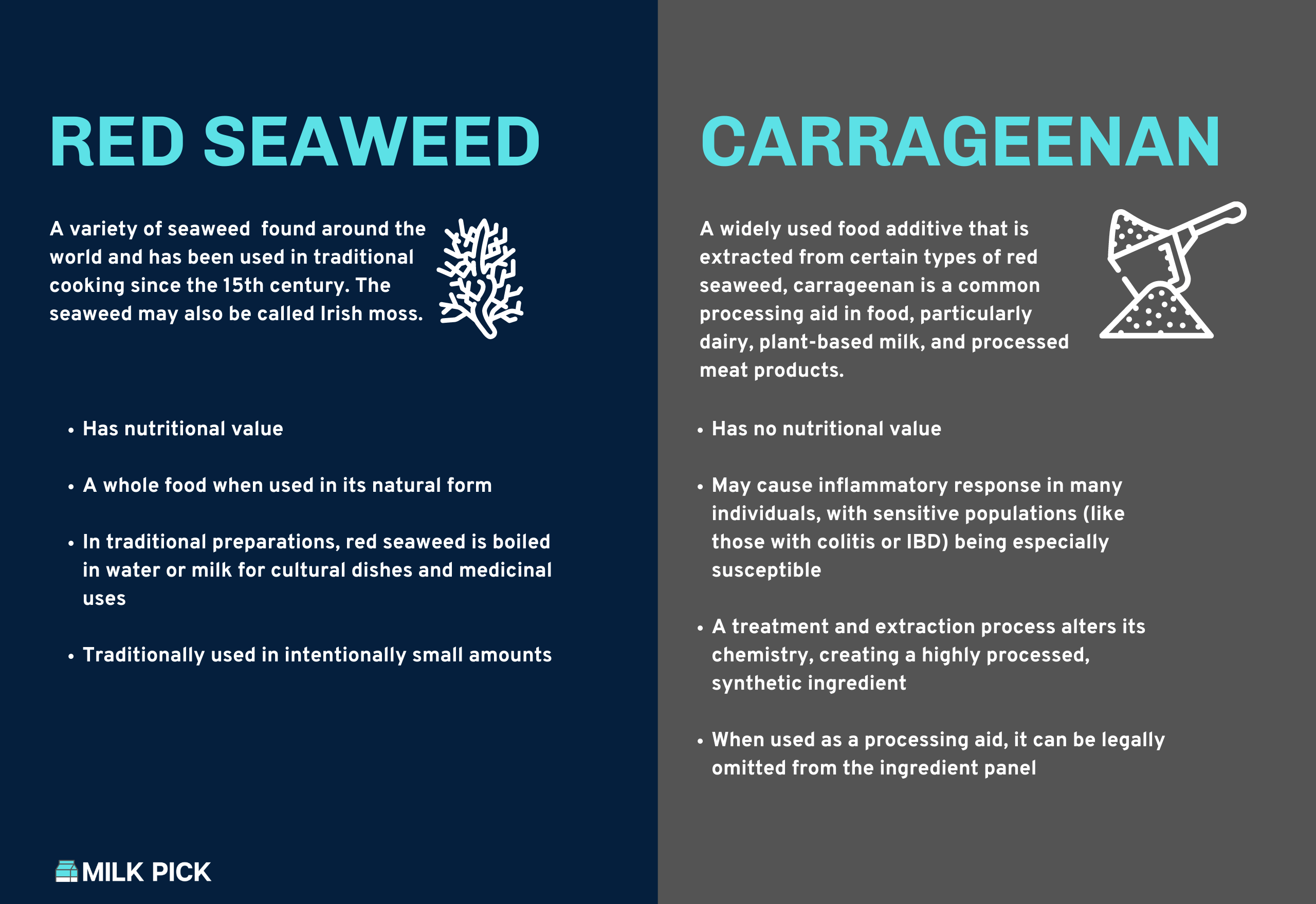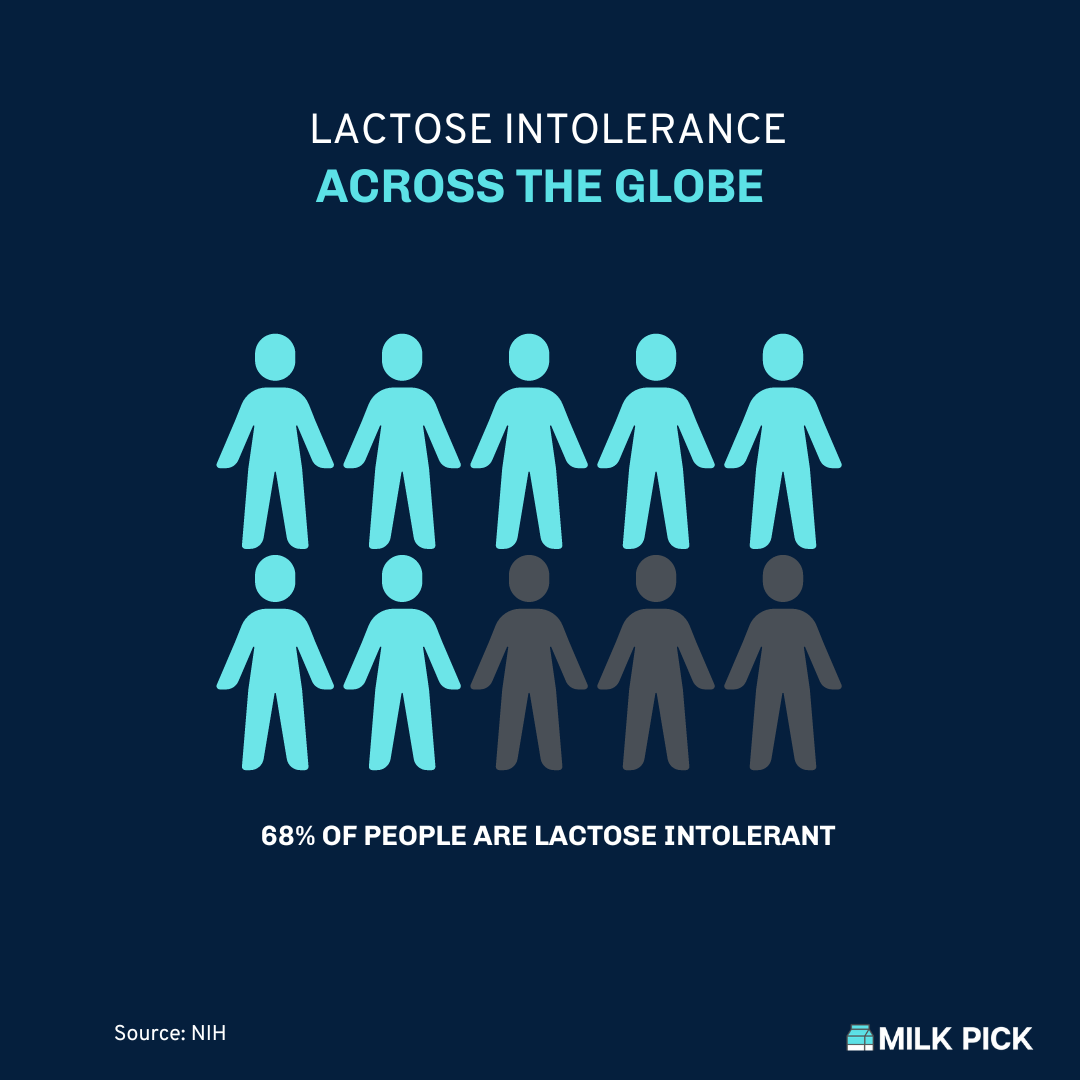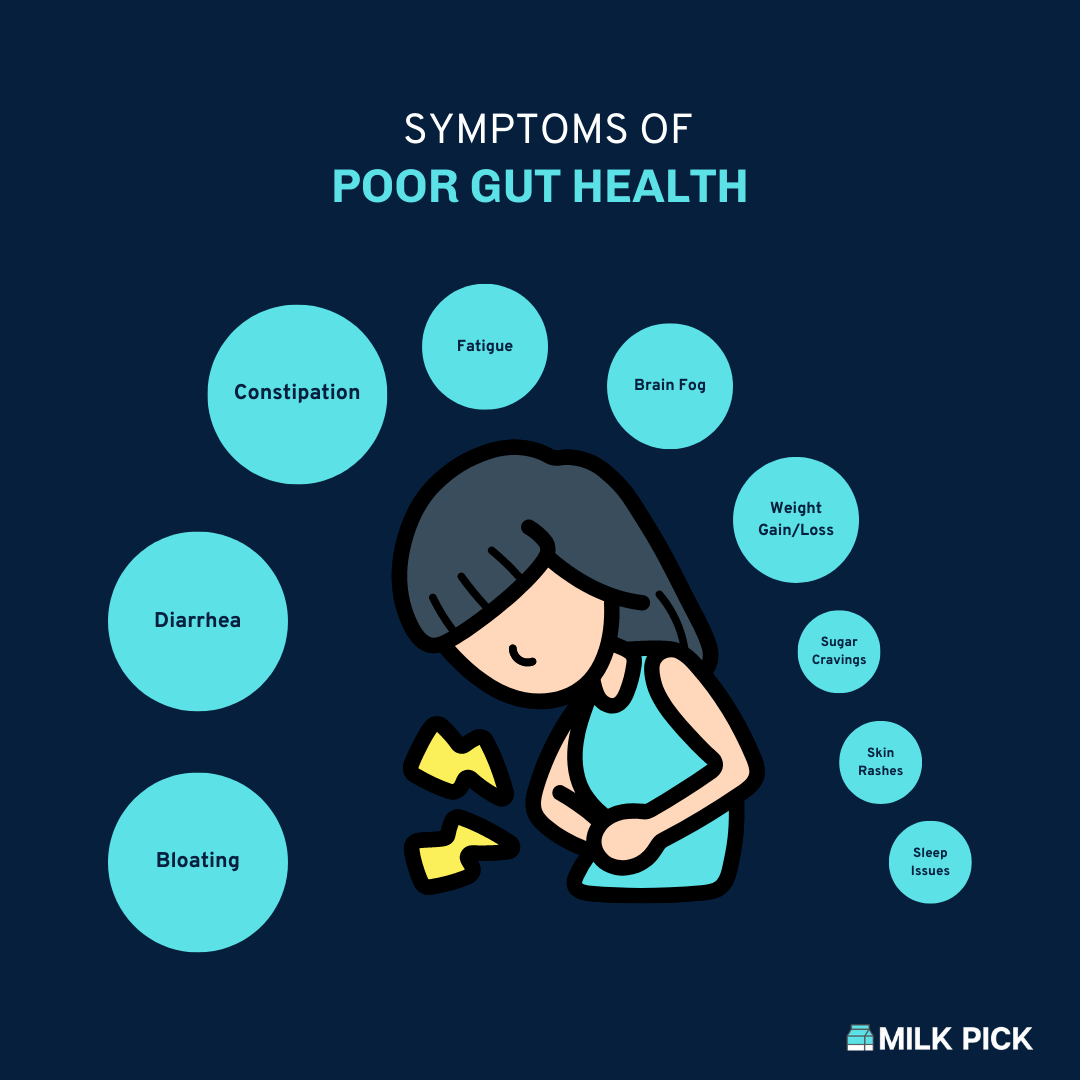Stomach problems and milk seem to go hand in hand these days, and people routinely cut out lactose in hopes of improving their gut health.
The new importance of gut health has led to an uptake in non-dairy alternatives, like almond milk.
That beg’s the question, is almond milk good for your stomach?
For most people, almond milk won’t have negative effects on their stomachs. In fact, you might find solace in almond milk if you have a sensitivity to cow’s milk.
But still, some people might find almond milk worsens existing digestive issues.
If you’re experiencing this issue, check the label on your almond milk. It might not be the almond milk hurting your stomach, but instead the additives in the milk.
Quick Answer
Is almond milk good for your stomach?
Almond milk can help with intestinal problems like constipation, diarrhea, bloating, and other digestive issues that affect your stomach.
Is Almond Milk Bad for Your Stomach?
No, almond milk is not inherently bad for your stomach, but that doesn’t mean everyone can tolerate it.
While not incredibly common, gastroenterologists have been seeing patients who aren’t able to tolerate milk substitutes.
That might sound scary if you’ve turned to milk alternatives to combat lactose intolerant symptoms.
However, it might not be the actual almond milk causing intolerance, but instead all the additives.

Some almond milk on the market contains additives like sugar, gum, flavoring, and carrageenan.
Carrageenan is a red seaweed extract that is used in foods like almond milk as an emulsifier and thickening agent.
Some scientists believe that carrageenan is highly inflammatory and bad for your digestive tract and the cause of digestive diseases like IBS, colitis, or even colon cancer.
This can sound scary, but it’s important to remember the research to support these claims is minimal.
So minimal, in fact, that the FDA recognizes carrageenan as being “relatively safe.”
So, is almond milk good for your stomach?
Research supports both sides of the argument, so the only way to know for sure is to try almond milk yourself and monitor yourself to see if you experience any symptoms of digestive upset.
Just because carrageenan is considered “relatively safe” doesn’t mean you won’t experience negative side effects from it.
For best results, reach for unsweetened almond milk without additives.
Why Unsweetened Almond Milk Is Good For An Upset Stomach
Almond Milk Is A Low FODMAP Food
FODMAP is an acronym for carbohydrates that are difficult to digest.
High FODMAP foods can trigger irritable bowel syndrome (IBS) symptoms such as:
- Diarrhea
- Constipation
- Bloating
- Abdominal pain
- Excessive intestinal gas
Almond milk is listed as a low-FODMAP food because it’s easy to digest compared to dairy. It will not trigger or worsen abdominal pain, diarrhea, constipation, and bloating, which are also symptoms of an upset stomach.
As such, it’s safe to assume that you can drink almond milk when you’re having stomach issues.
Gentle On The Stomach
Stanford Health Care recommends almond milk as one of the foods you can take when suffering from diarrhea.
Aside from being a Low-FODMAP food, almond milk is lactose-free, has plant-based proteins, and is low in saturated fat.
Plant proteins are easier to digest than animal proteins. And lactose-free milk is the best option for people with diarrhea, regardless of whether they’re lactose intolerant.
Diarrhea depletes the enzyme the body uses to digest lactose. The undigested lactose could then worsen your diarrhea, bloating, gas, and nausea.
Foods high in saturated fats can also worsen stomach upsets because they’re harder to break down and tend to slow down digestion. Research shows that fatty foods can interfere with small bowel movements and lead to gas retention and bloating.
Has Anti-Inflammatory Properties
An upset stomach is caused by inflammation of the stomach lining and other issues.
Almond milk might help calm your stomach since it contains anti-inflammatory components like vitamin E.
Studies show that Vitamin E can protect against conditions affecting the stomach lining.
It can help minimize the inflammation along your digestive tract and help your muscles relax. As a result, it might reduce abdominal cramping and spasms.
Might Help Manage Some Symptoms
Aside from reducing abdominal cramps, almond milk has nutrients that might help with other symptoms.
Its calcium, magnesium, phosphorus, and potassium could help reduce bloating by decreasing water retention in your body.
The magnesium and calcium in almond milk give it alkaline properties, enabling it to neutralize and reduce stomach acidity. Therefore, it might help relieve heartburn and manage acid reflux.
Phosphorus and calcium might also help with diarrhea. Some forms of calcium are often used to manage the symptom.
Additionally, almond milk might offer some relief if you’re constipated. Dietary magnesium and phosphorus help move food along the gut and have natural laxative qualities.
It Might Help Replenish The Electrolytes In Your Body
Vomiting and diarrhea can lead to life-threatening health problems because they can cause electrolyte imbalance and dehydration.
Fortunately, almond milk contains phosphorus, magnesium, potassium, and sodium - electrolytes that have important roles in the body.
Electrolytes can help prevent dehydration by maintaining fluid balance within the cells. They also help direct and move water along the body to areas that need it urgently.
Professionals recommend fluid and electrolyte therapy as a critical life-saving measure for people suffering from dehydration due to vomiting and diarrhea.
Consuming almond milk and drinks that contain electrolytes might help improve your condition. They might rehydrate you and replenish lost nutrients.
Why You Should Avoid Almond Milk With Additives
Many commercial almond milk brands contain additives that can trigger digestive issues and harm your gut health.
Let’s look at some of those additives and how they can affect you.
Carrageenan
Carrageenan is a thickening additive extracted from red seaweed. It’s often added to almond milk to give it a creamy texture.
The additive also stabilizes almond milk. It prevents the ground almonds from separating and settling into the bottom of the container.

Research shows that carrageenan can harm one’s digestive health. It’s also linked to inflammatory bowel disease and stomach ulcers, among other issues.
Despite the controversy, the FDA recognizes it as a safe ingredient.
However, it does cause issues for people with sensitive stomachs, especially those with digestive disorders like ulcerative colitis, Crohn's disease, and irritable bowel syndrome (IBS).
You should avoid carrageenan when you have an upset stomach because it might make you sicker and delay your recovery.
Lecithin
Commercial brands often use soy or sunflower lecithin as emulsifiers.
They’re plant-based additives that make almond milk smoother and creamier by binding water and the natural fat in almonds.
Although they’re natural ingredients, they might cause issues like bloating, cramping, and diarrhea in some individuals.
Lecithin could make you feel worse when you have an upset stomach, even if you’re not usually sensitive to the ingredient.
Guar Gum
Guar gum is another type of emulsifier added to commercial almond milk.
While it’s listed as a safe food additive by the FDA, it might trigger allergic reactions and cause digestive issues like bloating in some people.
Research also shows that it can worsen intestinal inflammation, especially in individuals with irritable bowel disease.
Guar gum rarely causes issues when taken in small amounts, but it's best to avoid it when your stomach is sensitive.
Sugar
You might be tempted to drink sweetened almond milk. But bland foods are highly recommended for people with nausea, vomiting, diarrhea, and other digestive issues.
Sugar isn’t good for upset stomachs because it's difficult to digest.
According to Havard Health, sugars (including artificial sweeteners) can also increase diarrhea. They stimulate the gut, causing the release of water and electrolytes - resulting in loose bowel movements that could trigger or increase diarrhea.
If you want to sweeten your almond milk, consider using bananas since they’re part of the BRAT diet.
BRAT stands for bananas, rice, apple sauce, and toast. They are gentle, easily digestible foods for people with stomach issues.
Who Could Benefit from Drinking Almond Milk?
One of the biggest drawbacks of drinking cow’s milk is the stomach problems that can accompany it.
In fact, it’s estimated that about 68% of the world’s population is lactose intolerant.

If you’ve been experiencing digestive symptoms like bloating, gas, or diarrhea after drinking cow’s milk, you might be experiencing symptoms of lactose intolerance.
Some lactose intolerant people are able to tolerate small amounts of lactose at a time, but if you’re not able to, you might need to switch out your cow’s milk for a milk alternative - like almond milk.
Almond milk isn’t just for lactose intolerant people, but it’s also a great option for people eating a vegan diet.
Vegans don’t consume animals or their byproducts, and almond milk has long been a top choice to replace cow’s milk.
Is Almond Milk Better For Your Gut Than Cow Milk?
Determining if almond milk is a better choice for you than cow’s milk comes down to a few factors.
First, one cup of cow’s milk, on average, is 150 calories, which is over three times the calorie content of a cup of almond milk.
Additionally, a cup of cow's milk has, on average, 8 grams of fat, and when compared to the 3 grams of fat in a cup of almond milk, cow’s milk is the fattier choice.
While the higher fat levels and calorie content in cow’s milk might make it seem like an unhealthier choice, cow’s milk does contain a significant amount of protein when compared to almond milk.
If you’re concerned about reaching your daily protein intake, cow’s milk, on average, has four times the protein content than almond milk.
Related: Is Almond Milk Good For Gastritis?
Are There Any Side Effects from Drinking Almond Milk?
For most people, drinking almond milk is perfectly fine. But some people may experience some adverse side effects.
Nut Allergies
Almond milk is a drink made by blending almonds, milk, and other additives.
Since the main ingredient is almonds, you should avoid almond milk if you have a tree nut allergy.
Drinking almond milk with a tree nut allergy can lead to anaphylactic shock.
High Sugar Levels
Almond milk comes in both unsweetened and sweetened versions.
In general, we recommend choosing an unsweetened version due to sweetened almond milk having upwards of 21 grams of sugar per serving.
Choosing unsweetened almond milk is especially important if you already experience digestive issues.
Thyroid Function
Goitrogens are compounds found in food that interfere with normal thyroid function, and almond milk is considered to be a goitrogen food.
When something interferes with a healthy functioning thyroid, the thyroid has trouble producing the hormone that helps regulate your metabolism.
If you have thyroid problems, it might be best to avoid almond milk altogether.
Intolerance
Additionally, if you already have digestive issues, you might want to be careful about which almond milk you choose.
While most brands have stopped using additives like carrageenan, that doesn’t mean every brand has. If you already have stomach problems, carrageenan can make it worse.
Make sure you check the nutritional label to ensure your almond milk doesn’t contain additives that can hurt your stomach.
The Best Almond Milk For Your Stomach
Here are some additive-free almond milk brands you can drink when you have an upset stomach.
JOI
JOI’s organic almond milk base is only made of almonds. Therefore, it contains all the natural fat, fiber, and proteins of whole almonds.
You’ll need to blend it with water for a 100% certified organic, additive-free glass of almond milk.
One jar of the almond base makes seven quarts of almond milk.
Elmhurst
Elmhurst’s almond milk is naturally thick and creamy because it contains four times more almonds per serving than most brands.
Its high almond content makes it one of the almond milk brands with the most protein.
Elmhurst uses a patented HydroRelease method to preserve the quality of the nutrients.
The milk is additive-free and consists of only two ingredients - almonds and water. It’s also Kosher and non-GMO verified.

New Barn Organics
New Barn Organics almond milk is an excellent choice for people who want additive-free, Whole-30-approved almond milk.
It’s made of organic almonds, sea salt, and filtered water.
The brand is certified organic, Kosher, and Non-GMO Project verified.
Three Trees
Three Trees Organic Almond Milk share’s some similarities with Elmhurst’s almond milk.
Both brands use four times the almonds used by other brands and contain almost the same amount of protein. Elmhurst has 5 grams of protein, while Three Trees offers 4 grams per serving.
They each consist of two ingredients and use GMO-free almonds.
The main difference is that Three Trees is a certified organic brand.

Malk Organics
Malk organics almond milk consists of unfiltered water, Himalayan pink salt, and organic almonds.
It’s a USDA-certified brand that uses GMO-free and pesticide-free almonds.
Homemade Almond Milk
Homemade almond milk is great for people with stomach issues because it doesn’t contain additives.
You can refer to our guide if you’re interested in making almond milk at home.
The best thing about homemade almond milk is you can customize the recipe and use as many almonds as you like.
Why Should You Care About Gut Health?
Most people don’t think about their gut when they think about their health, but your gut microbiome is essential to your overall health.
Research shows that 80% of your immune system and a majority of your body’s serotonin is in your gut. So if your gut is unhealthy, so are you.
Your gut also does more than just digesting your food.
It’s also where your body absorbs all the nutrients and minerals from the food you eat.
If your gut isn’t healthy, it won’t work correctly, which means you won't be absorbing all the nutrients and minerals you need.
Even worse, an unhealthy gut won’t get rid of metabolic waste and toxins, which can cause issues like chronic fatigue and inflammation.
In case you need more convincing, here's a short video from Microbiology Society about the importance of a healthy gut.
What Are Some Symptoms of Poor Gut Health?
There are always bacteria in your gut, but an unhealthy gut is a gut that has more bad bacteria than good bacteria.
The easiest symptoms of poor gut health to identify are also the most obvious.
Digestive issues like constipation, bloating, gas or diarrhea often point to an unhealthy gut.
If you have an unhealthy gut, you might also find yourself experiencing unexplained fatigue, brain fog, weight gain, or weight loss.
Lesser known symptoms of poor gut health include sugar cravings, skin rashes, sleep issues, or unexplained mood disorders like depression or anxiety.

Overall, Is Almond Milk Unhealthy?
Overall, no, almond milk is not unhealthy. But that doesn’t mean there aren’t unhealthy almond milk options on the shelf at your local supermarket.
If you’re concerned about having a healthy gut but still want to drink almond milk, there are still options for you.
To find almond milk that, hopefully, won’t have negative impacts on your gut health, you’ll need to consult the nutrition label.
Look for almond milk with no carrageenan, artificial or “natural” flavors, added sugars, and little to no added gums or emulsifiers.
Keep Your Gut Healthy & Happy!
You can’t be healthy unless your gut is healthy, too.
Unsweetened additive-free almond milk is good for an upset stomach.
It’s gentle, easy to digest, and free of additives that could aggravate your condition.
Unsweetened almond milk also contains nutrients that might help you with symptoms like abdominal cramping, diarrhea, and bloating.
It could help ease the inflammation in your stomach lining and replenish the electrolytes in your body when combined with other fluids.
Avoid sweetened almond milk because the added sugar can worsen your condition. However, you can make a banana almond milk smoothie if you want to improve the unsweetened almond milk’s taste.
Remember, almond milk isn’t a remedy for an upset stomach. But one of the few foods you can take as you seek treatment or wait for your condition to improve.
We advise that you consult a doctor if you experience prolonged or extreme symptoms.
